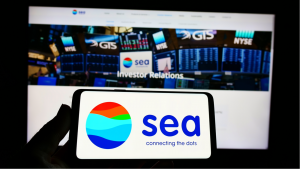The 3 Most Undervalued Fintech Stocks to Buy in May 2024

Source: Wright Studio / Shutterstock.com
Why does everyone love investing in fintech companies? It’s probably because most of us can see how flawed the traditional finance system is. With fintech platforms, we can carry out any banking or investing directly online without paying exorbitant fees from a big bank. They also allow us exposure to alternative financial assets like cryptocurrencies directly in the palm of our hands.
So are fintech companies a good investment? As with any sector, it has its winners and losers. The platform must have good technology and provide benefits to leaving the security of a major bank. Here are three fintech companies we think have a bright future and are worth buying in May.
Coinbase Global (COIN)

Source: rarrarorro / Shutterstock.com
Coinbase Global (NASDAQ:COIN) is the largest crypto exchange in the United States. It has over 100 million registered users across more than 100 countries worldwide. After its recent earnings report, Coinbase received some strong analyst upgrades. The price target range for COIN is between $111.10 to $472.50, with an average price target of $249.69.
Even if you don’t know a thing about cryptocurrencies, you’ll appreciate how well Coinbase is operating. The company has established itself as the industry standard for custodial security. It is the official custodian for the spot Bitcoin ETFs. Coinbase also launched its Ethereum-based layer-2 protocol Base, from which it collects transaction fees for trades.
Coinbase is still trading at fairly lofty valuations but the potential growth it has in the coming years makes these multiples easier to swallow. Shares are trading at 14.8x sales and 56.5x forward earnings. With a five-year revenue compounded annual growth rate (CAGR) of 42%, Coinbase has plenty of runway to grow into its inflated valuation.
PayPal (PYPL)

Source: Michael Vi / Shutterstock.com
PayPal (NASDAQ:PYPL) is an American payment services company that was founded in 1998 by a group that included Peter Thiel and Elon Musk. The stock has tumbled in recent years as growth has been slow but steady. Analysts have an average price target of $69.68 for the stock with a street-high price target of $111.80.
It’s hard to beat PayPal when it comes to transferring funds online. With more than 300 million users across more than 200 different countries, PayPal is the most used online payment services app in the world. Under new CEO Alex Chriss, the company seems to be rejuvenated. Most recently, PayPal reported a 10% growth in net revenue and a 14% increase in total payment volumes for the quarter.
PayPal has grown its revenue at a CAGR of 14% and net income by 26% over the past 10 years. Shares are trading at about 2.3x sales and 15.2x forward earnings. Although PayPal has been under scrutiny from shareholders, these are attractive multiples to buy the stock at given its growth trajectory. Chriss is still early in his turnaround of the company and is focusing on bringing in more small and medium-sized businesses to the ecosystem.
Sea Ltd (SE)

Source: Wirestock Creators / Shutterstock
Sea Ltd (NYSE:SE) is a Southeast Asian company that operates in multiple industries including e-commerce, fintech and mobile gaming. Analysts have a one-year price target range of $41.00 to $92.00 with an average price target of $72.46. This indicates the potential for about a 10% upside from its current price.
This stock was once a darling of growth investors but has lost much of its value since the early 2020s. Sea relies on its Shopee e-commerce site, its Garena mobile gaming business and the Seamoney financial services division. Seamoney offers users in Southeast Asia access to online payments, purchase financing and online banking. Through the ShopeePay mobile wallet, users can make direct purchases from thousands of global merchant partners.
Sea has been focusing on cutting costs and re-investing in its Shopee platform. Shares are trading at just 3x sales but investors are awaiting a return to consistent profitability. Despite this, analysts have raised their price targets for the stock anticipating a continued recovery by the company.
On the date of publication, Ian Hartana and Vayun Chugh did not hold (either directly or indirectly) any positions in the securities mentioned in this article. The opinions expressed in this article are those of the writer, subject to the InvestorPlace.com Publishing Guidelines.



